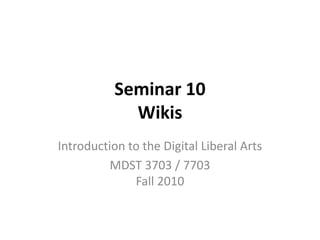
MDST 3703 F10 Seminar 10
- 1. Seminar 10 Wikis Introduction to the Digital Liberal Arts MDST 3703 / 7703 Fall 2010
- 2. Business • Any WordPress issues? • Other issues to raise?
- 3. Review • Blogging and RSS – The Great Chain of Blogging – Personal broadcasting meets established news • MSM = “Mainstream Media” • Are blogs useful to academics? – Not the same asking if blogs can/should/will replace the the academic essay and monograph • Our concern is with effects which are still not fully understood and evolving
- 4. Overview • Today we look at wikis, one of the major media genres of the web – history, form, content, function/effects • Learn to use a simple wiki • Discuss the role of wikis within the ecology of academic work • Discuss future directions of wikis
- 5. What is a Wiki? • A kind of web site invented by Ward Cunningham – The simplest database possible • Radical Simplicity – All pages are directly editable through the web – All versions are saved – Simple syntax, e.g. CamelCase defines a link • Now hundreds of varieties of wiki software and wiki sites
- 6. The first wiki: the Portland Pattern Repository http://c2.com/cgi/wiki
- 7. Exercise—using PHPWiki • Go to http://ontoligent.com/wiki • A PHPWiki site, based on the original wiki • Everyone create a page – On the front page, click on “MDST Student Pages” – Find your page – the ? means the page has not yet been created – Start adding content ...
- 8. Some Basic Syntax • CamelCase (aka WikiSyntax) creates links – When you save, new links will show a question mark – Also square brackets can be used • Image URLs surrounded by square brackets will insert images directly – e.g. [http://somewhere.com/myimage.png] • Lists are made with * or # prefixes • Headers are made with !, !!, or !!! prefixes
- 9. How are wikis different than blogs?
- 10. Wikis vs. Blogs Personal wikis, e.g. TiddlyWiki WIKIS BLOGS Collaborative Blogs, e.g. Daily Kos Individual Collective diachronicsynchronic
- 11. Other differences • Hypertext—wikis have more links and greater link density • Aesthetics – wikis tend to be plainer, more meat and potatoes • Metacritical—wiki lexia tend to include comments on their own condition
- 13. Are wikis useful for academic work? Both tend to be open (socially and editorially) and to oppose the culture of expertise
- 14. Academic Wikis • Stanford Encyclopedia of Philosophy – http://plato.stanford.edu/about.html • Arché TWiki – http://arche-wiki.st- and.ac.uk/~ahwiki/bin/view/Main/WebHome
- 15. Wikipedia • Best example of wiki logic (wiki culture) – Form: basic wiki – Content: encyclopedia knowledge (tertiary source) – Function/effect: ??? • Reviled (but secretly used) by academics, librarians and educators – Why the bad rep?
- 16. Prestige?
- 18. “Structures of Participation” • Media forms entail different structures of participation – Producers – Consumers – Relations between producers and consumers – Relations between producers – Relations between consumers • Think of literature, newspapers, radio, TV – The web has spawned several new media forms
- 20. Freebase • Consists of Topics and Relations – Everything is a topic, all topics have IDs – Topics are linked by relationship types • An attempt to build a knowledge base on top of Wikipedia. Why? – Meant to be machine readable – Wikipedia doesn’t have an API • Example of what we are building when we build Wikipedia
- 21. DBpedia • An attempt to reverse engineer an ontology from Wikipedia • Converts structured and extracted data from articles in Freebase-like sentences – Uses RDF • Forms a machine readable resource for semantic web applications • See http://dbpedia.org
- 23. RDF vs HTML • See http://dbpedia.org/page/Charlottesville • A sample data record extracted from Wikipedia • Can be viewed in a semantic web browser – E.g. OpenLink, a Firefox extension • Connects to other RDF datasets on the web – e.g. Geonames (owl:sameAs)
- 24. Hypertext as logical network http://mikelove.wordpress.com/2007/09/17/why-freebase-if-we-already-have-wikipedia/
- 25. Web 3.0
- 26. The Machine is Us(ing Us) People Wikipedia Facebook Twitter Semantic Web Machines (Machines are participating too)
- 27. Technology, Culture and Academia • Both blogs and wikis represent both a set of technologies and a set of values and principles – Blogging = personal opinion – Wikis = openness (e.g. WikiLeaks) – Both compete with traditional academic values • Two responses – Maybe academic values should change – Maybe the technologies can be “worked,” as there is no absolute requirement that culture and technology would go together
- 28. The Three Webs • Web 1.0 – 1991 to 1999 – HTML, Perl • Web 2.0 – 2000 to 2010 – PHP, DHTML, AJAX • Web 3.0 – 2010 to ??? -- RDF, HTML5
Hinweis der Redaktion
- Mention the Social Network – we still don’t know what this is ...
- What is a database? Compare to what preceded this ... relational dbs
- DISCUSS LA TIMES ARTICLE -- Remark on value of the comments – connect to Great Chain of Blogging WHAT IS REALLY AT STAKE IN THESE DISCUSSIONS IS AN ANCIENT SYSTEM OF PRESTIGE
- NETWORK EFFECTS MAY OVERWHELM TRADITIONAL MODES OF ASSIGNING VALUE
- We don’t know where this is going ....
- Freebase is like DBPedia DBPedia is not meant for humans
- It works by extracting data from Wikipedia Freebase also does this, but gets data from other sources, including registered users
- Explore C’ville page with dbPeda page and then OpenLink